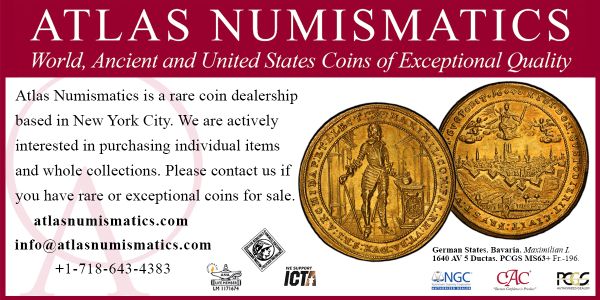
PREV ARTICLE
NEXT ARTICLE
FULL ISSUE
PREV FULL ISSUE
V25 2022 INDEX E-SYLUM ARCHIVE VOCABULARY TERM: LEGENDHere's another entry from Dick Johnson's Encyclopedia of Coin and Medal Terminology. -Editor Legend. The lettering following the contour, circumference or outer shape of a coin or medal; the wording near the edge, most often in a form of an arc just inside the border. Lettering in such an arc is called bowed (the letters have a bowed base line). The legend differs from inscription (virtually all other lettering on a numismatic or medallic piece, on a straight base line, most often horizontal); it also differs from the exergue (lettering in the area below a line across the bottom of the device). Legends on coins and medals reinforce the theme and concept of their design and occasionally are like the wider meaning of the word legend: repeating a statement from a previous generation. In England legends are called circumscriptions. The wording in a legend is often contracted or abbreviated to get the required statement into a small space. Also legends are often in a language different from the country issued – as Latin – to further add to their obscurity. Translating legends, however, is a vital function of numismatic study and legends are often indexed in numismatic literature. A legend containing errors of any kind (misspelled words or titles, errors of dates or figures, or mis-struck letters) is called blundered legend. Legends normally run clockwise, or left to right, however Arabic and other languages read right to left. Legend is also the lettering on a coat of arms or heraldic shield in any position. The legend may also be a motto, somewhat of a slogan, if it appears next to the border. Multiple line legends. The legend is usually only one row of lettering along the rim, adjacent to the border or border elements. However, the legend may be more than one line. Such a double legend was used as early as 1250 on French coins. Modern examples of doubled and multiple legend are illustrated. Three or more lines of legend are rare, but do exist. An extreme case is a six-line multiple legend on the Barcelona Columns of Julia Augusta Medal of 1970, issued by Calico in Spain. The legend has a list of countries throughout the world with cities named Barcelona. A spiral legend is a circular legend that runs in an ever decreasing pathway inside previous lettering, a volute, often to the very center of the design. Early legend technique. Hill and Pollard in Medals of the Renaissance tell of early portrait medals modeled on a disk and the legend modeled on a separate ring that fits closely around the disk. Examples are found with the lettering in different positions in relation to the portrait, so the ring was kept separate, and rotated to different positions between castings. This method was employed in the 15th century by Amadeo da Milano, a jeweler turned medallist, by Enzola and others. See border. References:
N19 {1993} Mackay, p 51-77.
To read the complete entry on the Newman Numismatic Portal, see:
Wayne Homren, Editor The Numismatic Bibliomania Society is a non-profit organization promoting numismatic literature. See our web site at coinbooks.org. To submit items for publication in The E-Sylum, write to the Editor at this address: whomren@gmail.com To subscribe go to: https://my.binhost.com/lists/listinfo/esylum All Rights Reserved. NBS Home Page Contact the NBS webmaster 
|
